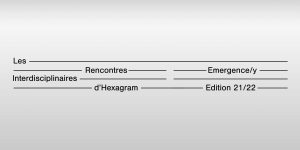Online

You and I, You and Me
Mindaugas Gapsevicius (LT/DE)
Imagine the future. Humans, computing machines, and various types of hybrids share the space they live in. Senses are altered, some are inextricably linked to computing devices. Electricity is used to control the space and the beings living in it.

Plant trafficking workshop
Brigita Kasperaitė (LT/DE)
The workshop "Plant trafficking" re-thinks the monetary value of nature and its place in our daily lives. The journey that plants take until they settle in one's home makes us see them as trophies.

Sourdough DNA
Kamilė Krasauskaitė (LT)
The workshop questions food consumption and origins. Major topics and interests in this workshop include commensality, experimental food design, patterns of time, as well as the collaboration between humans, microorganisms – how do these factors shape the food we eat?

Beyond human art: creation and the posthuman
Sofian Audry (CA), Edwige Armand (FR), Gisèle Trudel (CA), Navid Navab (CA), Danny Perreault (CA)
Can nonhuman machines and processes have any pretension to “originate anything”? Can art exist outside of its human framework, decoupled from the socio-techno-cultural context in which it is produced? How can we (re)imagine artistic creation in this new posthuman paradigm? In this round table, the participants approach these questions through the themes of metacreation, nonhuman creation in plants, ecosystems, environments, and excitable matter(ials), as well as human-nonhuman collaboration and co-creation.

Research-creation 03: IMMERSION & INTERACTION + SCALABILITÉ
Puneet Jain (IN), Rilla Khaled (CA), Gina Hara (HU/CA), Allison Moore (CA), Ludovic Amaru (CA), Gabrielle Couillard (CA), Gaëlle Scali (FR/CA), Atypical (FR)
Umwelten, GAMERella 2021, CLOUD BODIES, SCALABILITÉ

Research-creation 02: MACHINE RELATIONS + REC Discussion
Joe Zeph Thibodeau (CA), Marc-André Cossette (CA), Alexandre Saunier (FR/CA), Ceyda Yolgormez (TR/CA), Evan Hile (CA), David Jhave Johnston (CA), Sofian Audry (CA), Ionat Zurr (AU), Cynthia Noury (CA), Paloma Leyton (AR/CA), Gaelle Scali (FR/CA)
Chronogenica, Poetics of Otherness, Harvesting Signs in Post-Semiocapitalism, REⓒ Discussion

Keynote Discussion Panel: MACHINE + BODY
Christopher Salter (US/CA), David Rokeby (CA), Angélique Wilkie (BE/CA)
In this Hexagram special Keynote panel, three artists researchers (Chris Salter, Angélique Wilkie and David Rokeby) engage in an open discussion on the emerging phenomena in machine-body interaction.

BALANCE-UNBALANCE: THE FUTURE STARTED NOW
Andrés Felipe Gaviria (CO), Gabrielle Couillard (CA), Kasey Pocius (CA), Mario H Valencia (CO), Oscar Ceballos (CO), Leah Barclay (AU), Ricardo Dal Farra (AR/CA), Rob La Frenais (UK/FR), Felipe Londoño (CO), Roger Malina (US), Pablo Suarez (AR/US)
“Balance-Unbalance: The Future started Now” is the second encounter in a series of roundtables gathering scientists, artists, architects and curators to help us think about what we should do today to change course and to have a possible future, considering the serious risks we face given the growing environmental crisis.

Outer Space and the City: Provocations for the Urbanization of Space Technology
Marie-Pier Boucher (CA), Alice Jarry (CA), Emiliano Gandolfi (IT), Bernard Foing (FR), Guillaume Pascale (CA), Lee Wilkins (CA), Philippe Vandal (CA), Isabelle Boucher (CA)
The interactions between urban environments, technology, and communities are increasingly dependent upon space telecommunication infrastructures. However, these infrastructures are both out of sight and out of reach. What techniques can be deployed to assess, and subvert, their materiality and socio-environmental impact?

Workshop - Indigenous Protocols and Artificial Intelligence working group
Michelle Lee Brown (US), Suzanne Kite (US/CA), Ceyda Yolgormez (TR/CA), Jason Edward Lewis (CA)
Our relationship to artificially intelligent technologies is largely framed by popular media, news reporting, or major scientists’ claims. These frames restrict such systems to notions of control and utility, all the while keeping the black-box of these technologies intact, and thus furthering an elite-expert hegemonia that had been defining how to think of AI since the last half of the previous century.

